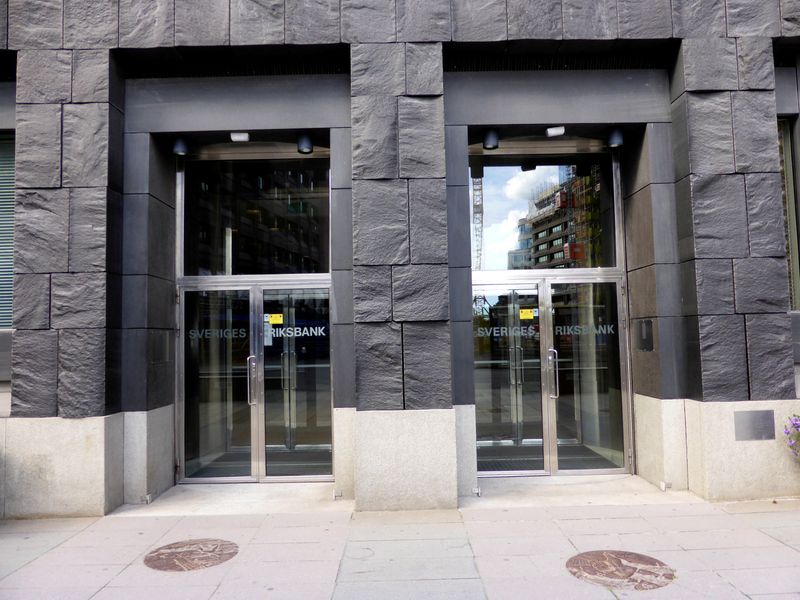Swedish central bank raises policy rate, more needed to tame inflation
2022.11.24 05:35
[ad_1]

© Reuters. FILE PHOTO: A view of an entrance to Sweden’s central bank in Stockholm, Sweden, August 12, 2016. REUTERS/Violette Goarant
By Simon Johnson
STOCKHOLM (Reuters) -Sweden’s central bank raised its key interest rate by three-quarters of a percentage point on Thursday to 2.5% and signalled further hikes next year to fight surging inflation.
The Riksbank, which as late as February expected rates to remain at zero for the coming years, has been surprised by the pace of price rises this year, sparked by the lingering effects of the pandemic and the war in Ukraine.
It got another unpleasant shock from October’s figures which showed core inflation jumped by 7.9%, forcing a more hawkish shift in policy at what was long-time Riksbank Governor Stefan Ingves’ last scheduled rate-setting meeting.
“The risk … the current high inflation will become entrenched is still substantial,” the central bank said in a statement.
“The forecast shows that the policy rate will probably be raised further at the beginning of next year and then be just below 3 percent.”
At its previous meeting in September, the Riksbank had outlined a 50 basis points hike in November with interest rates peaking around 2.5% next year.
Markets, however, still think the central bank is behind the curve, seeing rates peaking around 3.25% in autumn next year.
“We still think that the Riksbank will hike by another 50 bp also in February,” Swedbank said in a note.
There is little the Riksbank can do about current inflation, but it wants to prevent surging prices spilling over into higher wages in a self-reinforcing spiral.
At the same time, the economy is expected to contract next year. Mortgage costs have risen, house prices are sliding and many households are already struggling with a cost-of-living crisis.
More rate hikes will increase the short-term pain, though the Riksbank argues that by acting now, it reduces the risks that rates will have to go even higher at a later date.
Uncertainty is high, however.
In the United States, the Federal Reserve may soon scale back the pace of its interest rate rises. In Europe, some rate-setters at the European Central Bank are worried aggressive hikes will only serve to worsen the downturn that all expect.
Banking group Nordea said it expected the Riksbank to hike to 2.75% in February, but start easing policy in early 2024.
“The economy will simply be too weak,” Nordea economist Torbjorn Isaksson said in a note.
Analysts in a Reuters poll had forecast a 75 basis point hike and that the central bank would raise its rate-path forecast. The Swedish crown was broadly unchanged after the announcement.
[ad_2]
Source link








